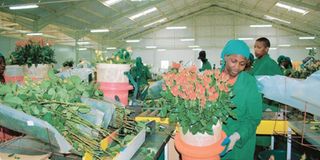Not a rosy affair, but flowers bloom

A worker at the Oserian flower farm in Naivasha. PHOTO | FILE
What you need to know:
- The industry is currently stuck at 125,000 tonnes translating to Sh46 billion as of last year, a figure that has, on average, remained constant for the last couple of years in spite of the expected growth projections of 5 per cent every year.
- Sally Nicholas of Olij Breeding and Propagation Farm, says many investors still prefer Kenya to Ethiopia’s authoritarian regime, which imposes rigorous standards that demand the government’s hand in every process.
From the delightfully displayed flowers, to the vibrant tones of the exhibitors, and the enthusiastic guests and patrons, it has been a rosy affair at the just concluded international flower expo in Nairobi.
Yet behind the veneer of this rose-coloured ambience at the show, which started Wednesday and ended yesterday is an industry reeling under stress.
Stunted growth and pending partnership agreements have combined to choke one of Kenya’s biggest foreign exchange earner and knocked off the sails of the thousands of farmers who depend on the sector for a livelihood.
Jane Ngige, the chief executive of the Kenya Flower Council, a lobby that represents the different players in the industry, warns that the industry is at a tipping point because efforts by Kenya to establish itself as an important player in the international market have been dealt a blow by the emergence of a myriad of challenges.
She explains: “The industry has not been growing as anticipated because of many reasons, but mainly because of the pending partnership agreements particularly with the EU, which is the destination of our flowers.”
The signing of the agreements would enable Kenya to export its flowers to the EU destinations quota-free.
It would also provide certainty and predictability to operators and potential investors.
“The Kenyan flower industry has been a very significant player in the global market coming third after Colombia and Ecuador, but it is not growing and we are not seeing as many investors as would be expected because of the uncertainty in whether Kenya will sign or opt out,” she said on the sidelines of the expo.
The industry is currently stuck at 125,000 tonnes translating to Sh46 billion as of last year, a figure that has, on average, remained constant for the last couple of years in spite of the expected growth projections of 5 per cent every year.
Ms Ngige says the players are pushing the government and hoping that the negotiations can be concluded by the end of this month, otherwise they will have to incur further costs of up to eight-and-half and 14 per cent in duty to sell in EU, adding grimly that this may be straw that will break the camel’s back.
Rise in taxes on most of inputs that are crucial for the growth of the industry has further dampened the hopes of farmers and other players.
With the new tax regime, Erik Van Duijn of the marketing and sales company DFG Africa says their operation cost is up by 60 per cent.
“This is probably why some of the companies are expanding into the Ethiopian market and not here,” Duijn says. Expensive land in Kenya is another challenge.
“The number of permits here is just too high, and the regulatory bodies involved mean we are paying more for functions that can be put under one comprehensive centre. The cost of energy, water, labour and now the recently increased National Social Security Fund contributions and land has gone up,” he enumerates.
“The cost of production has gone up by 80 per cent while growth in returns is only 7 percent and has stagnated since 2008,” Ngige chips in.
It is, however, not all gloom and doom for the blooming industry.
Sally Nicholas of Olij Breeding and Propagation Farm, says many investors still prefer Kenya to Ethiopia’s authoritarian regime, which imposes rigorous standards that demand the government’s hand in every process.
She cites the recent entry of a Colombian Flower company Fleurafrica, as a demonstration of the advantage Kenya has.
According to KFC, there are more Colombian flower companies that have been enquiring and shown interest in establishing farms here.




